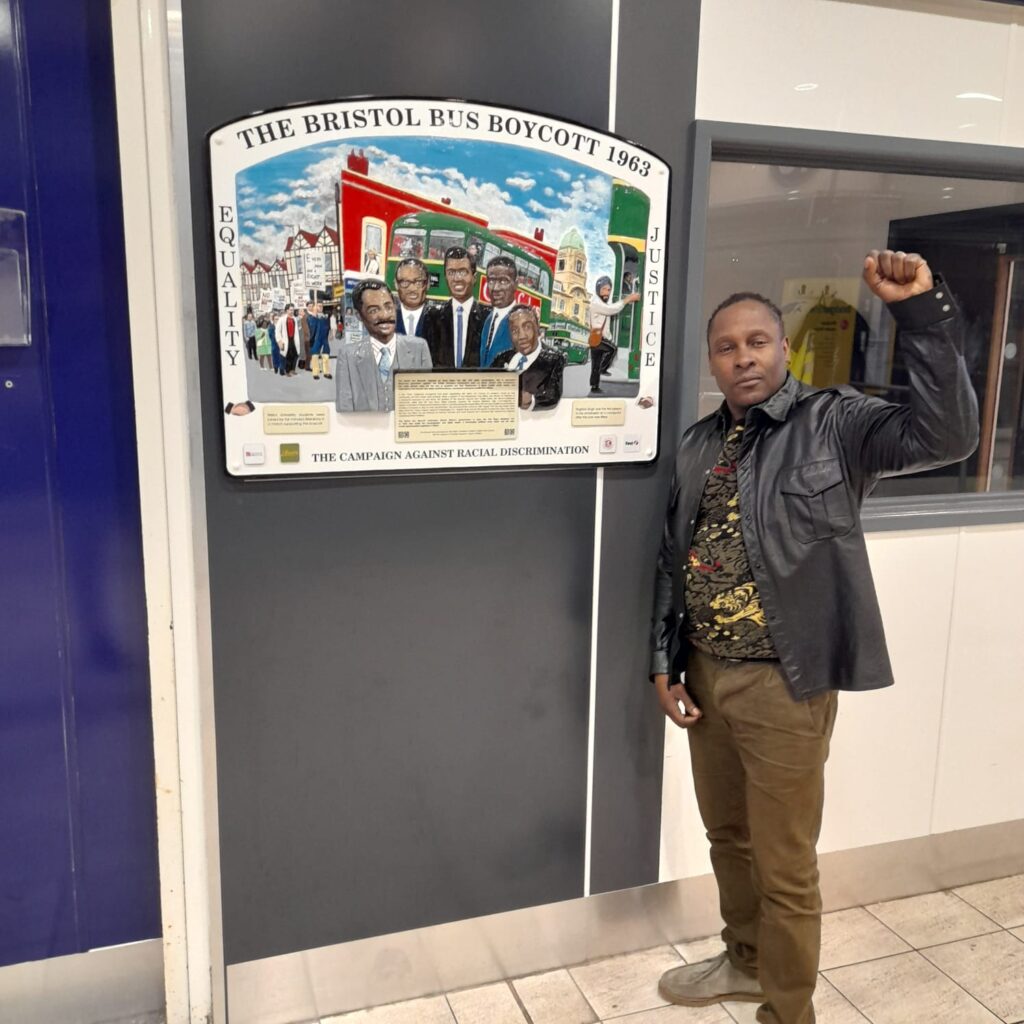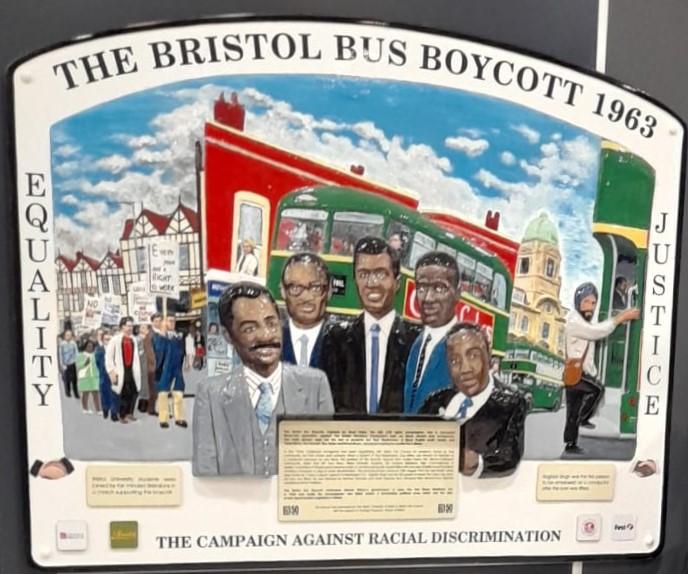The Bristol Bus Boycott- that ended discriminatory employment in the Bristol Omnibus Company and sparked national conversation is celebrated this week, 60 years later. The months-long struggle to achieve justice for workers from the West Indies is one of many examples of resilience and collective action in Black British history. The Boycott’s sentiment of being the change continues to resonate today.
With an estimated 3,000 residents of West Indies heritage living in Bristol at the time, the nationalised Bristol Omnibus Company was racially discriminatory in its employment and treatment of prospective Black workers that could not secure jobs as bus crew and instead were relegated to lower positioned work. Such discrimination persisted despite severe labour shortages across the city.
When speaking of the discrimination that took place, Julz Davis, a Bristol Bus Boycott campaigner, said:
“When people arrived in that windrush wave, what they found wasn’t the opportunity promised in the adverts and recruitment drive. Instead they were met with the colour bar. In Bristol they [the action group] decided to take lead from the Civil Rights Movement and do an economic boycott of the bus company.”
In response to the discrimination, an action group swiftly formed (named the West Indian Development Council), announcing a boycott that received media attention and public support from fellow Bristolians. This was the start of a momentous occasion for Black British History, despite often being overshadowed by the better-known Civil Rights Movement across the pond. On 27th August negotiations with the TGWU and Company began and on the 28th of August the company agreed to end discrimination in the employment of bus crews. History had been made for the company, the city, and British race relations.
Active allyship played an integral role in the action group’s success as Davis explains:
“Allyship was important to the Bristol Bus Boycott. Those who boycotted the colour bar had the allyship of Tony Benn. He was a white MP who went into the House of Commons in 1963, where there were no black or brown MP’s and he was able to convince the Prime Minister and his fellow MP’s to introduce the Race Relations Act.”
In Reni Eddo-Lodge’s bestselling book, Why I’m No Longer Talking to White People About Race, she praised the enduring power of the boycott when listening to Paul Stephenson (one of the figureheads) speak 50 years later:
“Paul, his voice withered by age and activism and righteous rage, commanded the attention of the whole room. I felt like I was listening to history.”
The Boycott is now praised as a catalyst for the Race Relations Act of 1965 and the Race Relations Act of 1968 that outlawed racial discrimination in employment. The Boycott is evidence that change happens when it becomes everyone’s business.
The Bristol Bus Boycott 60 years on…
Despite the breakthrough of 1963 and the legislation that followed, formal apologies and recognition for the Boycott have lagged. In 2013, Unite (formerly the Transport and General Workers’ Union) released a formal apology for their “completely unacceptable” approach at the time of the Boycott. Alongside the awarding of OBEs, the Lord Mayor of Bristol wrote a formal apology to Guy Reid-Bailey OBE who had experienced immense discrimination when applying for a job at the company to further the Boycott’s cause. Deputy Mayor, Asher Craig, spoke of the continued significance of the Boycott on Bristol today:
“The Bristol bus boycott had a lasting impact not only in our city, but across the UK, as it drew political attention to the treatment black people were facing… While the boycott is now rightly seen as what it was – a peaceful protest aiming to end racist employment practices – we shouldn’t forget the level of opposition they faced at the time.”
This summer saw over 100,000 people attend Bristol’s St Pauls Carnival on 1st July, which was first founded in 1968. The ‘Carnival 365’ initiative seeks to promote the spirit and educational purpose of carnival all-year round, ensuring the history and culture of Black Bristol continues. Vice chair of the carnival, Carole Johnson, stated:
“We’re always very mindful that we stand on the shoulders of some great giants from the past because part of our tradition is oral, we have to make sure that we are passing on history.”
It is clear that the city continues to celebrate their rich and resilient history, as apparent in much of the UK and diaspora. But…
What does employment practice look like 60 years on from the Boycott?
Echoing the Boycott, the fight for non-discriminatory employment practice continues across many sectors today. Research corroborates what our community continues to tell us…
CIPHR’s survey of 2000 people found that 66% of ethnically diverse students have felt discriminated against when applying for a job. Two UK-based fieldwork studies conducted before the COVID-19 Pandemic found that ethnically diverse individuals are less likely to secure “good work” compared to their white counterparts, with employer discrimination as the largest barrier for these groups. In the UK, the unemployment rates remain disparate between white and non-white ethnic groups, in which the government-recognised unemployment gap is at 4.3% as of December 2022.
Though approaches for more equal employment practice are increasingly used such as blind CVs, guaranteed interviews, and skills-based assessments it is apparent that not enough is being done.
Whilst the onus is on employers to improve their practice, we all have responsibility to be part of the change.
To Davis, active allyship in the workplace cannot be overlooked:
“If we look at our workplace, especially leadership, we find that our environments are predominately white, male and university educated. It doesn’t mean that people who fit into these categories don’t see the case for change, it just means that we need their active allyship, which needs to be authentic. It means, at times, they need to step back and let ethnic minorities lead.” Image below – Julz Davis next to the Bristol Bus Boycott Commemorative plaque

60 years on from the Bristol Bus Boycott, how can you be part of the positive change you want to see?
Today can be the first step in making history for a more equal society.
We would value your thoughts. If you want to see change and race equality in the workplace, join the Race Equality Matters’ movement or showcase the impactful work your organisation is already doing by applying for our Trailblazer series.
Find below exciting work that Curiosity Unltd are doing to celebrate the Bristol Bus Boycott, get involved!:
The Big Bristol Bus Boycott Takeover
Collaborating with 60 changemaker organisations which come up with 60 ways to celebrate the anniversary
The Big Thank You
If you could say anything to the Bristol Bus Boycott leaders to say thank you, what would it be?
Download our question card from our website, take a selfie and put it on your socials
And hashtag#raceforpower + @curiousity_unltd
We would value your thoughts, please do follow us and join the conversation on LinkedIn
If you want to see change and race equality in the workplace, join the Race Equality Matters’ movement if you are not registered already.
Register here.
Image curtesy of Julz Davis

